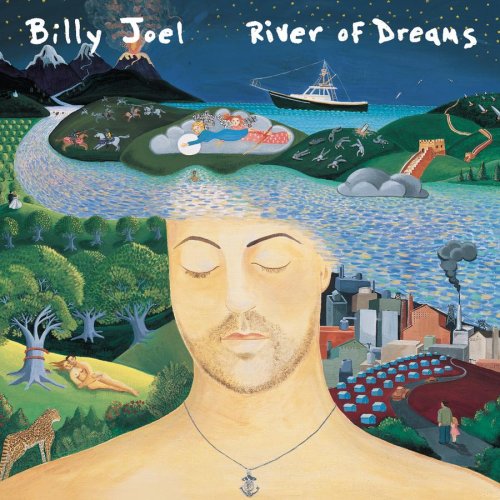
River of Dreams (1993)

1. No Man's Land
2. The Great Wall of China
3. Blonde Over Blue
4. A Minor Variation
5. Shades of Gray
6. All About Soul
7. Lullabye (Goodnight, My Angel)
8. The River of Dreams
9. 2000 Years
10.Famous Last Words
In retrospect, River of Dreams was never just another Billy Joel album. It was the swan song, though few realized it at the time. There is a weight to the record that suggests a man reckoning with not just the world around him, but with the creative engine that had driven him for two decades. Joel, once the pugnacious street poet of Glass Houses and the nostalgic crooner of An Innocent Man, here emerges bruised, disillusioned, and spiritually fatigued.
The first thing one notices is the darkness. The lyrics, far from the sardonic bite of his early work or the sentimental gloss of his mid-period hits, are unflinchingly bleak. From the opening bars of No Man’s Land, there’s a sense of a worldview collapsing under its own cynicism. It's a biting critique of suburban decay, of broken promises dressed in consumer gloss—a thematic cousin to Allentown, but angrier, less romanticized.
Joel’s emotional state bleeds throughout. Blonde Over Blue and All About Soul, ostensibly love songs, seem hollowed out by hindsight—particularly after the very public unraveling of his marriage to Christie Brinkley during the tour that followed. Even the record’s most optimistic moments feel guarded. Joel doesn’t radiate hope so much as grope toward it.
Following the success of Storm Front, Joel again sought new collaborators, this time enlisting Danny Kortchmar—veteran of Don Henley’s solo excursions—for production. The result is a polished, muscular sound, but also one that seems oddly distant. Kortchmar brings a lacquered professionalism, but the emotional resonance sometimes gets buried in the mix. The album often sounds like a record built to sound like a record, rather than an organic outpouring.
Yet River of Dreams is not without its triumphs. The title track, with its gospel-tinged groove and soaring chorus, stands among Joel’s finest late-period compositions. It hints at spiritual yearning without the usual trappings of piety—a searching, uncertain anthem for uncertain times. Likewise, The Great Wall of China and No Man’s Land crackle with rhythmic and lyrical fire, even if their sonic palettes feel borrowed (listen closely and you’ll catch more than an echo of Foreigner and The Cars).
What’s most revealing is the album’s closing number, Famous Last Words. A gentle, self-referential ballad that serves as both epilogue and confession, it finds Joel quietly admitting what the rest of the album has been hinting at: the muse is leaving, the well is running dry. “There will be other words some other day,” he sings, but the conviction is missing. He knows, even then, that this is the end.
And so it was. Billy Joel would never release another pop album. The decision, in retrospect, was both surprising and wise. Too many artists cling to diminishing returns, sullying legacies with forgettable work. Joel chose instead to freeze-frame his pop career before decay set in. His concerts would continue—massive, sold-out affairs that confirmed the public's enduring appetite for the catalog—but the songwriter had spoken his last.
River of Dreams may not be his most beloved album. It is not as cohesive as The Stranger nor as ambitious as The Nylon Curtain. But it is perhaps his most human. Flawed, honest, and wounded—it is a record of final reckonings.
Back To Main Page
Go To Next Review